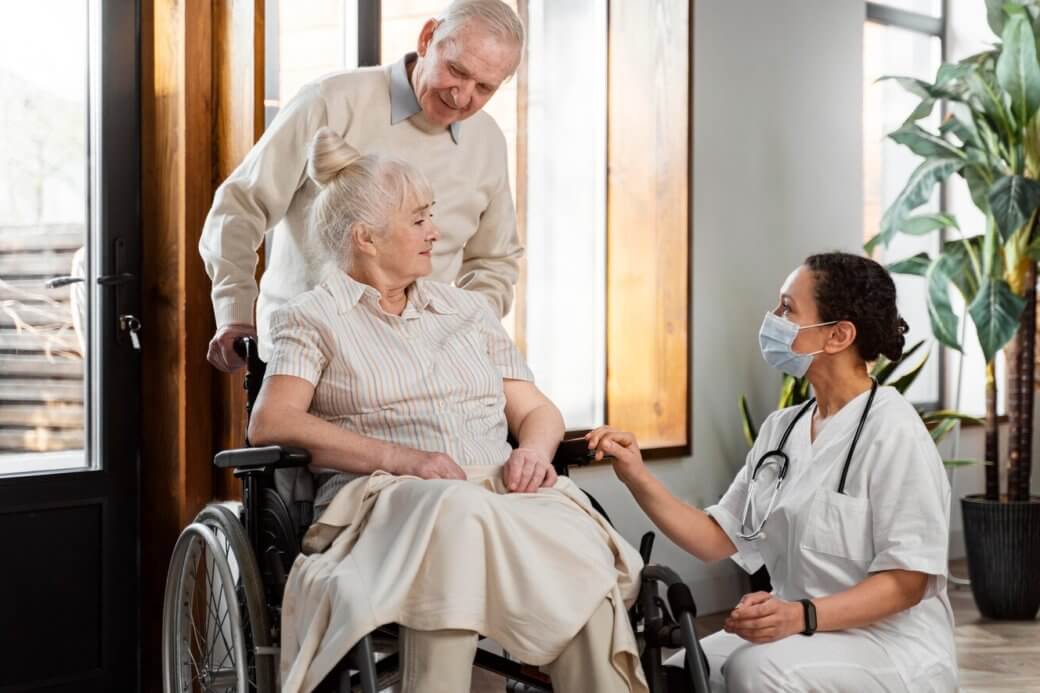Wellness Checks and Routine Health Monitoring in Senior Communities

The Imperative of Routine Health Monitoring
An Ageing Population in Scottsdale, AZ
The demographics are precise: Scottsdale, AZ, like many communities across the nation, is witnessing a growing senior population. This trend underscores the necessity for enhanced senior care solutions. Central Scottsdale Assisted Living by MD Senior Living stands at the forefront of this vital service and routine health monitoring.
The Significance of Regular Wellness Checks
For seniors, a regular wellness check can be the difference between early detection of potential health issues and the onset of significant complications. These checks ensure that the elderly remain in the best possible health. Moreover, it provides peace of mind to family members, knowing their loved ones are safe.
The Role of Technology in Health Monitoring
The use of modern technology, such as wearable devices and remote monitoring tools, has made health tracking more accurate and immediate. It’s not just about identifying problems but proactively managing them. Central Scottsdale Assisted Living integrates such cutting-edge technologies, positioning us as leaders in senior health care.

Key Components of Health Monitoring in Senior Communities
Comprehensive Physical Examinations
Routine physical examinations offer an in-depth look into a senior’s overall health status. They include vital signs, organ function, and musculoskeletal system assessments. Regular checks ensure timely interventions if irregularities are detected.
Dietary and Nutritional Assessment
Nutrition plays a pivotal role in seniors’ health. Regular assessments ensure that the elderly are receiving the right nutrients and vitamins essential for their well-being. It also aids in making necessary dietary adjustments to prevent or manage health conditions.
Cognitive and Mental Health Evaluation
Mental health is just as vital as physical health. Routine assessments of cognitive function help in the early detection of conditions like dementia or Alzheimer’s. Furthermore, by monitoring mental well-being, emotional disorders such as depression can be addressed proactively.
Benefits of Health Monitoring in Assisted Living Facilities
Personalized Care Plans
One of the most significant advantages of routine health monitoring is the creation of personalized care plans. By understanding each resident’s unique needs, Central Scottsdale Assisted Living crafts tailored approaches to ensure optimal health and comfort.
Fostering Independence
While it might seem counterintuitive, regular health checks promote independence among seniors. By addressing health concerns early on, seniors can maintain their autonomy and continue with their day-to-day activities with minimal hindrance.
Strengthened Community Ties
When seniors feel cared for and monitored, it fosters a sense of belonging and trust within the community. Health monitoring ensures physical well-being and nurtures the emotional bonds between residents and caregivers.
Challenges and Solutions in Routine Health Monitoring
Keeping Up with Rapid Technological Advances
The pace at which health tech evolves can be overwhelming. However, Central Scottsdale Assisted Living is committed to staying updated. We invest in training and technology, ensuring that our seniors benefit from the latest advancements.
Respecting Privacy and Dignity
While health monitoring is crucial, respecting seniors’ privacy and dignity is essential. Balancing comprehensive care with individual rights is a priority for us. We always prioritize consent and involve residents in their health management decisions.
Effective Communication with Family Members
Keeping family in the loop is critical. We believe in transparent communication, ensuring that families are always informed about their loved one’s health status and any necessary interventions.
Central Scottsdale Assisted Living’s Commitment
Expertise and Compassion in Senior Care
At Central Scottsdale Assisted Living by MD Senior Living, we merge medical expertise with genuine compassion. Our team understands the unique needs of our senior residents and is dedicated to providing top-notch care in a warm, welcoming environment.
A Proactive Approach to Wellness
We believe in prevention over cure. By focusing on routine health monitoring, we aim to mitigate potential health risks and enhance the quality of life for every resident in our Scottsdale community.
Choosing the Right Assisted Living Facility
Location Matters: Scottsdale, AZ
When it comes to senior living, the location is crucial. Scottsdale, AZ, offers a conducive environment for seniors with its warm climate, senior-friendly amenities, and a strong sense of community. Central Scottsdale Assisted Living takes pride in being a cornerstone of this vibrant community, providing seniors with a comfortable and enriching living experience.
Quality of Care
Not all assisted living facilities are created equal. The quality of care differs from one institution to another. Always look for establishments like Central Scottsdale Assisted Living that emphasize routine health monitoring as a core component of their services.
Feedback from Current Residents and Families
One of the best ways to gauge the quality of an assisted living facility is by listening to current residents and their families. Their firsthand experiences provide valuable insights. Central Scottsdale Assisted Living welcomes prospective residents and their families to interact with our community, ensuring complete transparency.
Preparing Seniors for Routine Health Monitoring
Setting the Right Expectations
While the idea of regular health checks might seem daunting to some seniors, setting clear expectations can ease anxieties. It’s essential to emphasize the preventive nature of these checks and how they contribute to overall well-being.
Incorporating Feedback
Seniors should be active participants in their health journey. By incorporating their feedback and adjusting care plans accordingly, seniors feel valued and involved, fostering a sense of ownership over their health.
Emphasizing Continuity
Routine checks aren’t standalone events. They’re part of a continuum of care aimed at ensuring seniors lead healthy, fulfilling lives. Emphasizing this continuity can help seniors see the broader picture and appreciate the benefits of regular monitoring.
The Future of Health Monitoring in Senior Living
Integration of Advanced Technologies
As technology continues to advance, we can expect even more sophisticated health monitoring tools. The future looks promising for senior health care, from AI-driven diagnostic tools to virtual reality-based cognitive assessments.
Holistic Wellness Approach
The focus will shift from merely monitoring physical health to a more holistic approach. This means considering factors like emotional well-being, social connectivity, and mental agility as integral parts of routine health checks.
Increased Family Participation
With tools like telehealth and real-time health-tracking apps, families will be more involved in their loved one’s health. This fosters trust and enhances the overall support system for seniors.
Conclusion
The importance of wellness checks and routine health monitoring in senior communities cannot be overstated. As our loved ones age, they deserve the very best in care, compassion, and medical oversight. Central Scottsdale Assisted Living by MD Senior Living, located in the heart of Scottsdale, AZ, is deeply committed to ensuring that every senior in our care enjoys optimal health and well-being.
Your loved ones deserve the best. If you’re considering a senior community emphasizing routine health monitoring and holistic well-being, call Central Scottsdale Assisted Living by MD Senior Living. Our experts are here to assist. Phone: 619-831-1112.






Leave a Comment